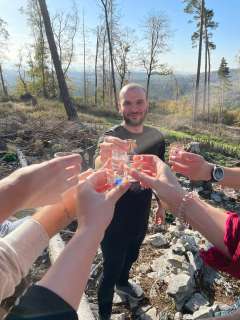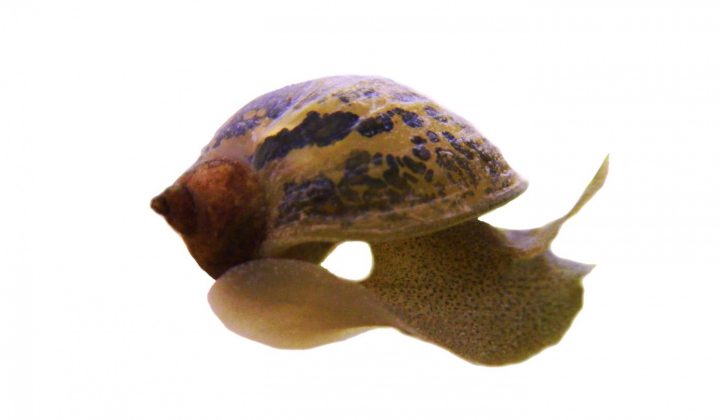
Head

Research interests
The focus of my research is the genomic basis of niche evolution, speciation and local adaptation with closely related species pairs and intraspecific variation in land and freshwater snails, non-biting midges and extremophile molly fishes. We take an integrative approach: field studies, ecological and evolutionary experiments, comparative genomic approaches and experimental evolution. The ultimate vision thereby is to relate ecological differences functionally to their genomic basis.
Former Projects:
D1: cross-taxon genomic basis of climate-relevant fitness traits
D3: development of taxonomic dna-chips and other high-troughput tests for the routine identification of monitoring samples
D3.1: benthos barcoding
A1.3: radiation of pulmonata during the cenozoic [ellobioidea] (2008-2011)
A1.7: model selection
B1.14: tropical marine ecosystems: diversity and dynamics of coral reef ecosystems and reef-associated fish assemblages
C5.2: evolutionary adaptation potential of key aquatic species of different climatic regions
Employees

Research interests
evolutionary genetics, evolutionary ecology, behavioural genetics
I am interested in the adaptive potential of organisms to their environment. This may include abiotic factors, such as temperature, as well as biotic factors, such as the interplay within a social ant colony.
Niche evolution
Closely related species, as well as different populations of one species, often occupy different niches and are thus adapted to different environmental properties. I’m interested in the adaptive potential of species to their environment, specifically to changing temperature and climate conditions. In this respect, a combinatory approach of studying both, proximate (phenotypic) as well as ultimate (genetic) traits is optimal. The combination of different methods (e.g. life-history trait determination, identification of selected genes) allows to draw conclusions on the proportion of phenotypic plasticity and evolutionary differentiation on the regulatory or structural level. As study organism I am working with the pond snail genus, Radix. Niche models have shown, that the distribution ranges between species (as well as populations) differ in temperature, as well as length of dry period.
Behavioural genetics
Social Hymenopterans feature a number of special traits, which clearly set them apart from all other animal groups. In ants, different worker castes and the queens develop from the same genetic background (polyphenism). In addition ant workers are further specialized on various tasks, from brood tending, over nest guarding to foraging. In some ant species behavioural caste differentiation is associated with morphological caste differentiation, however in other species monomorphic workers perform the different duties. I’m interested in the genetic mechanisms that lead to the development of the different castes as well as their differential behaviours. The genus Temnothorax is an ideal study system, as salvemakeing evolved several times independently, thus making it possible to investigate and compare the evolution of behavioural patterns in closely related species. In addition, the system allows to investigate co-evolutionary processes and local adaptation between closely related slavemaker and host species.
External Links
List of publications at Google Scholar Profile
Barbara Feldbmeyers’ Researcher ID
Team
Maide Nesibe Macit (PhD student)
Shadi Karimifard (PhD student)
Former Students
Marina Choppin (PhD student)
Austin Alleman (PhD student)
Juliane Hartke (PhD student)
Philip Kohlmeier (PhD student)
Matteo Negroni (PhD student)

I am an evolutionary biologist interested in molecular phylogenetics, genomics, systematics, biogeography and conservation. I use molecular tools in order to understand the evolutionary history of organisms, biodiversity origin, and molecular mechanisms at the population-species-environment interface. I have also experience working at Herbaria and I am passionate about natural collections.
My current projects aim to elucidate the demographic history of German wildcat (Felis silvestris silvestris) populations using whole-genome sequencing (WGS) and population genomics of European beech (Fagus sylvatica).
· 2014-2019 Ph.D. in Biology, Memorial University of Newfoundland, Canada. Thesis: ‘Historical biogeography of endemic plants in the Caribbean and Podocarpus as a case study’
· 2008-2009 MSc in Taxonomy and Biodiversity of Plants, Royal Botanic Garden Edinburgh & University of Edinburgh, Scotland. Thesis: ‘Phylogenetic and morphometric studies in Lathyrus L. Series Lutei (Fritsch), Papilionoideae and other yellow-flowered Lathyrus’
· 1999-2006 BSc (Hons) in Biology, University of Seville (US), Spain. Specialization in Botany and Ecology
Nieto-Blázquez, M.E., Quiroga, M.P., Premoli, A.C. & Roncal, J. (2021) Podocarpus in Hispaniola: a stepping-stone colonization story. Diversity and Distributions, 00, 1– 13. https://onlinelibrary.wiley.com/doi/10.1111/ddi.13444
Nieto-Blázquez, M.E., Peña-Castillo, L. & Roncal, J. (2021) Historical biogeography of Caribbean Podocarpus does not support the progression rule. Journal of Biogeography 48, 690-702. https://onlinelibrary.wiley.com/doi/abs/10.1111/jbi.14034
Roncal, J., Nieto-Blázquez, M.E., Cardona, A. & Bacon, C.D. (2020) Historical biogeography of Caribbean plants revises regional paleogeography. In: (eds.) Rull, V. and Carnaval, A. Neotropical Diversification. Springer Nature. https://link.springer.com/chapter/10.1007/978-3-030-31167-4_20
Pichardo-Marcano, F.J., Nieto-Blázquez, M.E., MacDonald, A.N., Galeano, G. & Roncal, J. (2019) Phylogeny, historical biogeography and diversification rates in an economically important group of Neotropical palms: Tribe Euterpeae. Molecular Phylogenetics and Evolution 133, 67-81. Editor’s choice paper. https://www.sciencedirect.com/science/article/abs/pii/S1055790318305633
Nieto-Blázquez, M.E., Antonelli, A. & Roncal, J. (2017) Historical Biogeography of endemic seed plant genera in the Caribbean: Did GAARlandia play a role? Ecology and Evolution 7(23), 10158-10174. https://onlinelibrary.wiley.com/doi/pdf/10.1002/ece3.3521

Research interests
In my PhD project, I am investigating the expected phenotypic and genomic variation in the non-biting midge Chironomus riparius, when exposed to a mixture of anthropogenic substances (e.g. tire abrasion from roads).
The assessment of the effects of anthropogenic inputs on the environment is currently limited to phenotypic traits and fitness, but before these effects manifest themselves, changes in genomic composition are expected (like allele frequency changes). The aim of my research is to exploit genomic methods to assess the effects of anthropogenic mixtures of substances.
However, population genomic analyses will be complemented by life-cycle experiments in order to gain a complete picture of the evolutionary consequences of stressor exposition over multiple generations.
Master´s thesis: “Ecotoxicological assessment of sludges and hydrochars using zebrafish Danio rerio embryos.” 04/2017 B.Sc. in Natural and Environmental Sciences, University of Parma
Bachelor´s thesis: “Comparative composition analysis between overlapping and non-overlapping genes of eukaryotic viruses.”

Research Interests
Global climate change is leading to increased temperatures and prolonged droughts. In Germany, the severe droughts of 2018 and 2019 caused a visible stress response in many European beech (Fagus sylvatica) trees, though some trees seemed unaffected. Indeed, a preliminary study identified Single Nucleotide Polymorphisms (SNPs) connected to drought resistance which convey a fitness benefit to the respective individuals. The goal of my PhD project is to further reveal the genomic basis of drought resistance in European beech and to ultimately develop an evolutionary-based management practice which will improve the adaptative potential of this species.
To this end I am performing Pool-seq analyses to investigate the selective forces already acting upon natural beech populations. This approach is complemented by a drought experiment with beech seedlings to test the implications of the genotype on phenotypic traits. Based on these findings we are going to develop a population genetic model to determine which forestry management practice allows adaptation to climate change and the fastest spread of drought-resistant genotypes in beech populations.
Vita
Since 2023 PhD at SBiK-F research group Molecular Ecology
Title: Fagus sylvatica under drought stress
2023 MSc. Ecology and Evolution, Goethe University Frankfurt
Thesis title: Changes in genomic expression as a response to light stress exposure in the midge Chironomus riparius
2021 BSc. Conservation Biology/Political Science/Environmental Chemistry, Koblenz Landau University
Thesis title: Temporal and spatial variation in community composition and diversity of Chironomids
2015 Diploma of Environmental Monitoring & Technology, Challenger Institute of Technology, Murdoch, Western Australia

Research Interest
My research interest lies in exploring the intricate connections between the environment and the genetic makeup of organisms. In particular, I am fascinated by the effects of temperature on mutation rates in the model organism C. riparius. This organism has been the subject of numerous studies and has been found to have a significant impact on the evolution of species. My research aims to delve deeper into this relationship and uncover new insights that will deepen our understanding of the natural world. My research focuses on the intricate connections between temperature, mutation rates, and the evolution of C. riparius. I aim to uncover new insights and understanding that will deepen our knowledge of the natural world in the field of evolution and ecology.
Research interests
Social insects are highly fascinating due to their exceptional organization structure, resembling that of a superorganism. These remarkable creatures have evolved complex social systems that facilitate collective action for the benefit of the entire colony, and a means of ensuring personal safety. However, what happens when this behavior is exploited, and the safety of the colony members as well as the colony as a whole is compromised?
In the context of my doctoral research, I am collaborating with PhD student Erwann Collin (University of Mainz, Germany) to investigate the consequences of disrupting this family dynamic through social parasitism. Specifically, we aim to explore the genomic adaptations of the host species Temnothorax longispinosus to its obligate social parasite, Temnothorax americanus. These two somewhat closely related ant species engage in a reciprocal cycle of co-adaptation, wherein the host must respond genomically, genetically, morphologically, and/or behaviourally to the adaptations of the parasite.
Our investigation entails analysing multiple populations along a gradient of parasite success to identify genomic fingerprints that directly link to the local success of the parasite. By doing so, we hope to ascertain whether coevolution takes different trajectories depending on the locale or if it occurs in parallel. Ultimately, our study will enhance our understanding of the genetic mechanisms of adaptation during coevolution, thereby contributing to the advancement of this critical field of study.
Vita
Since 2020: PhD Candidate, Johannes Gutenberg-University Mainz (AG Foitzik) and Senckenberg Biodiversity and Climate Research Centre (AG Pfenninger)
2017 – 2020: M.Sc. in Applied Bioinformatics, Johannes Gutenberg-University Mainz (Thesis: „ Gene expression analysis sheds light on molecular regulation of lifespan extension with fertility in workers of the ant Temnothorax rugatulus”, Supervisor: Prof. Dr. Susanne Foitzik)
2012 – 2017: B.Sc. in Biology, Heinrich-Heine-University, Düsseldorf (Thesis: „Comprehensive determination of unmapped reads in wild tomato species“, Supervisor: Prof. Dr. Laura Rose)
Publications
Stoldt, M., Macit, M.N., Collin, E., Foitzik, S. (2022) Molecular (co)evolution of hymenopteran social parasites and their hosts. Current Opinion in Insect Science. https://doi.org/10.1016/j.cois.2022.100889
Negroni, M.A., Macit, M.N., Stoldt, M., Feldmeyer, B. Foitzik, S. (2021) Molecular regulation of lifespan extension in fertile ant workers. Philosophical Transactions of the Royal Society B. https://doi.org/10.1098/rstb.2019.0736

My primary research foci lie within the realms of evolutionary ecology and epigenetics. I am particularly intrigued by the complex interplay between genetic mechanisms and environmental influences. Given that underlying mechanisms support the development of new phenotypes over time through evolution, I am very interested in investigating the mechanisms behind rapid diversification of insect CHC profiles in aculeate Hymenoptera. I am currently involved in a big project with a diverse research team, where we aim to evaluate the significance of different genomic and gene regulatory processes in the divergence of cuticular hydrocarbons (CHCs) across the phylogeny of aculeate Hymenoptera.
PhD Project
Evolutionary innovation involves genomic and regulatory mechanisms, especially intriguing in rapidly evolving traits like insects’ cuticular hydrocarbons (CHCs). The Aculeate Hymenoptera, with diverse CHC profiles and eusocial behavior, is an ideal model for studying these traits. Their social structure allows the study of caste-related CHC differences within a single genome, while their well-defined phylogeny aids in tracing genomic changes. Research focuses on gene expression in tissues from multiple individuals to represent diverse CHC phenotypes.
CHCs protect insects from desiccation and serve as chemical signals. In solitary insects, CHCs act as contact sex pheromones, while in social insects, they convey information about tasks, fertility, and recognition. Species typically have either methyl-branched alkanes or unsaturated CHCs, which can evolve rapidly, with closely related species often showing opposite profiles. This project aims to uncover the factors driving CHC diversification by studying 13 pairs of closely related species with distinct chemical profiles, examining gene expression, coding sequences, mRNA splicing, and regulatory processes, including differences between sexes and castes.
Shadi Karimifard (she/her/hers)
January 2023
PhD. Student. Johannes Gutenberg-Universität Mainz,
Title: Genomic and gene regulatory basis of rapid evolutionary diversification of a multifunctional trait
Direct Supervisors: PD Dr. Florian Menzel (FM), Mainz, Dr. Barbara Feldmeyer (BF)
Supervisors: Frankfurt a. M.;; PD Dr. Volker Nehring (VN), Freiburg; Prof. Dr. Oliver Niehuis (ON), Freiburg i. Br.; Dr. Jan Buellesbach (JB), Münster; Prof. Dr. Thomas Schmitt, (TS), Würzburg
2018-2021
Master student. Shahid Beheshti University, Tehran, Iran.
Title: Biodiversity and Ecosystems Management
Project Title: “Genetic diversity of earthworms in farmlands of the northern Zagros”
2012-2016
Arak University, Arak, Iran.
Bachelor of Science: Environmental Engineering and Science
Karimifard, S., Saberi-Pirooz, R., Ahmadzadeh, F., & Aghamir, F. (2023). Heliyon Investigating the impacts of agricultural land use on soil earthworm communities: A case study of northern Zagros Mountains of Iran. https://doi.org/10.1016/j.heliyon.2023.e23523
